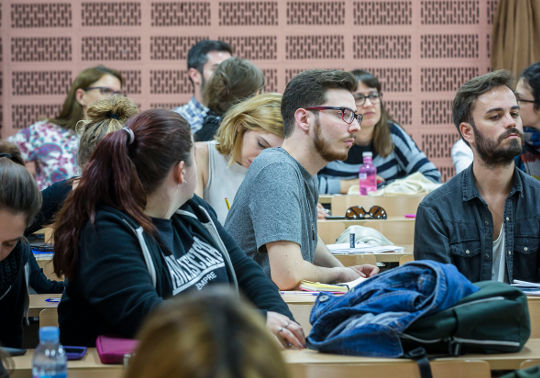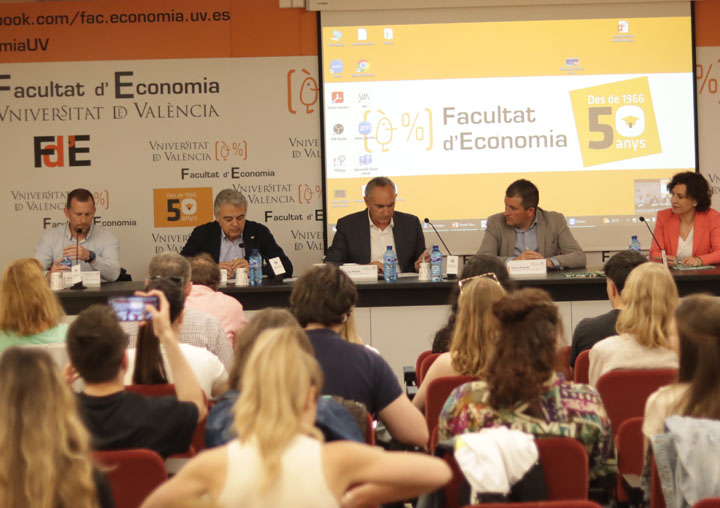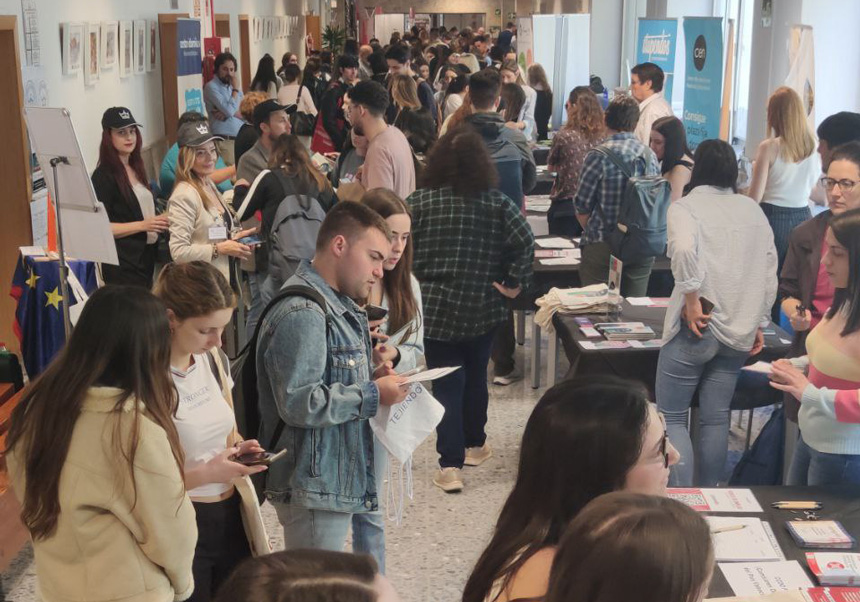The recruitment increases among students owning a Master's degree in Arts and Humanities, and matches the percentages of their Sciences and Engineering colleagues
- UV General Foundation
- May 22nd, 2018

The employment opportunities of master degrees are one of the main priority of students. The last study of Observatori d’Inserció Professional i Assessorament Laboral-OPAL of the Universitat de València meets questions and found that from 2010 to 2015 the recruitment of people graduated in the Arts and Humanities field has increased, equalising to the percentage of integration in the Sciences and Engineering areas.
This is due to a demand increase of specific degrees within the field. The same report concludes that the increase occurs in a notorious manner, for instance, in cases in which work was related with the master degree as well as when there are the ideal condition of degree-work: the job requires university studies and, moreover, is related to the master degree.
The study entitled “Progress report of the main indicators of employability of official master graduated of the Universitat de València”, collects the data of two surveys: the first includes graduated in 2010, 2011 and 2012 of 69 master degrees; and the second, that analyses 94 of this degrees, has been realised to graduated un 2013, 2014 and 2015.
The indicators of employability that the report presents are related to different times of the work career of the interviewed graduated, and are: job condition in the moment of survey, work experience subsequent to obtaining the degree certification and characteristics of current employment, or last in case of unemployed people in the moment of the survey.
One of the indicators of the employment situation is the percentage of graduated employees in the moment of the survey, in which recruitment increases from 68’2 to 74’7% between the two surveys. The greatest increase is in the Arts and Humanities area (from 56’9 to 70’9%) and in Social and Legal Sciences (from 63 to 75’9%). In the Sciences area, it decreases slightly (from 74’1 to 72’7%) and most notably the Health Sciences area (from 84’3 to 76%) and Engineering (from 90’5 to 71’8%). However, Sciences and Health Sciences areas continue to present the highest percentages of recruitments, situation coupled with Social and Legal Sciences area.
Regarding the work experience, the percentage of graduates that have worked after finishing a master’s degree has increased in five points: from 82,7% in 2010-2012 to 87,4% in 2013-2015. If we classify them by academic areas, the most important increase has occurred in Arts and Humanities, ascending from 67.9 to 83.9%. There has been also an increase in the area of Social and Legal Sciences (from 80.7 to 88.5%). On the contrary, it decreases in the rest of areas: Health Sciences, from 90.2 to 88.1%; Sciences, from 88.5 to 85.7%; and Engineering, from 95.2 to 87.2%. Therefore, the work experience of the graduates is matched in five different academic areas with a percentage of employment fluctuating among 83.9 to 88.5%.
Characteristics of the current or last job
In the current professional careers of the survey respondents, the report analyses a total of nine indicators. On the one hand, we can highlight the percentage of graduates whose first employment is quite related to the master’s degree. On the other hand, the percentage of those who have a double adjustment: the job requires university studies and is quite related to the master’s degree. In both cases, the percentage of graduates increases in the field of Arts and Humanities from 44.8 to 57.6% and 41.4 to 56.6%, respectively. However, the rest of academic branches decrease mostly Engineering and Sciences.
On the other hand, although the general enrolment percentages have increased, the percentage of permanents contracts has decreased from 34.5 to 30.1%. Therefore, temporary contract increases.
Finally, we see a slight increase in the average monthly net salary from 1,363.6 to 1,380.2 euros in full-time employment. This increase is due to the fact that salaries raises in all academic areas but Social and Legal Sciences, in which it decreases around 33 euros.
You can check the full and detailed report here.
The offer of the University
The Universitat de València has 114 master’s official degrees that can be distributed in five different areas: Architecture and Engineering (8), Arts and Humanities (15), Sciences (16), Health Sciences (21) and Social and Legal Sciences (54). Seven of them are compatible with double international degrees, 20 with interuniversity degrees and two are backed up by the Erasmus Mundus Programme of the European Union. Psychology of Work, Organisations and Human Resources, Theoretical Chemistry and Computational Modelling.
File in: Estudis , Inserció professional , Màsters Oficials , Fundació General UV , UVemployement















